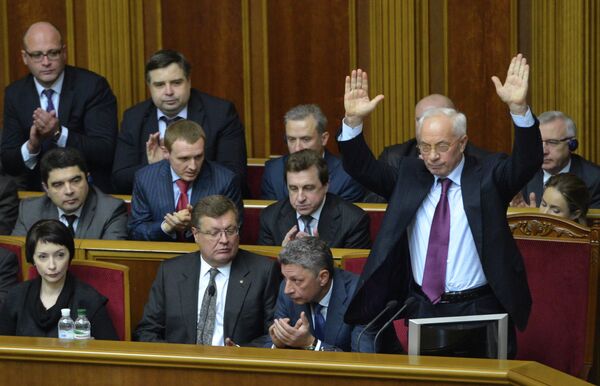KIEV, December 3 (RIA Novosti) – Ukrainian lawmakers swatted down a no-confidence measure Tuesday proposed by opposition leaders to try to force a new government as tens of thousands of mostly anti-government protesters rallied outside the state parliament building.
Only 186 deputies voted in favor of the measure to force the resignation of Prime Minister Mykola Azarov and his government, safely short of the required minimum of 226 votes.
Speaking just before the vote, Azarov promised he would make staff changes in the government, noting the momentum Ukraine’s protest movement has gathered after nearly two weeks in what began as demonstrations over the government’s sudden rejection of a long-awaited trade deal with the European Union.
“I will make firm conclusions, decisive personnel changes will be effected in the government,” the prime minister said before the vote in parliament on Tuesday.
Arseny Yatsenyuk, leader of the parliament’s Fatherland party faction, said the opposition would still demand the resignation of the government and early presidential and parliamentary elections.
Opposition leaders called for protesters to go and rally outside the presidential administration building after the vote.
Russian media reports put the number of anti-government protesters in the tens of thousands, and said no more than 300 pro-government demonstrators were also present.
Lawmakers including Azarov had trouble reaching the parliament to attend the voting session due to the hordes of demonstrators, who had also blockaded entrances Tuesday to the main government building and the Cabinet of Ministers.
About 1,000 paramilitary police officers were posted to guard government buildings around Kiev, Viktoria Kushnir, a spokeswoman for the Interior Ministry’s Internal Troops, told RIA Novosti.
Ukrainian President Viktor Yanukovych sparked a wave of protests when he unexpectedly put the brakes on a trade deal with the European Union last month, saying the country's economy would suffer and pledging instead to focus on strengthening ties with Moscow. Russia had repeatedly warned its smaller neighbor against signing the deal, and had threatened stricter customs procedures if it went ahead with the agreements.
Tens of thousands of pro-Western demonstrators have taken to the streets in Kiev and other cities around Ukraine since the announcement on November 21, some carrying signs bearing anti-government slogans and many demanding the resignation of the country’s leadership.
Demonstrations were largely peaceful until early Saturday, when police staged a brutal crackdown to clear Kiev’s Independence Square, the focal point of the Orange Revolution of 2004-2005. The next day, a mob attempted to storm the capital’s presidential administration building. Nearly 300 people were injured in the clashes, about 200 of them police officers, Ukraine’s Interior Ministry said Tuesday.
Yanukovych reached back out to the EU on Monday in an apparent attempt to placate protesters. The two sides agreed to resume talks, though the EU said the terms of the deal could not be renegotiated.
Despite the turmoil sweeping Ukraine’s capital Tuesday, the president himself left the country on a scheduled state visit to China until December 6, where he’s expected to sign a bilateral friendship and cooperation agreement.
Russian President Vladimir Putin likened the events unfolding in Ukraine to a pogrom Monday, saying the demonstrations were an attempt by the country’s opposition to destabilize the existing government.


